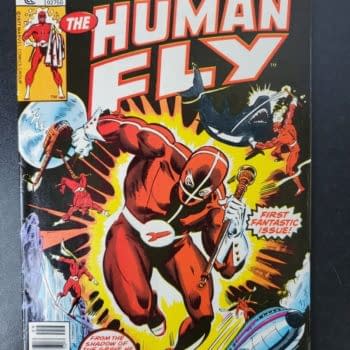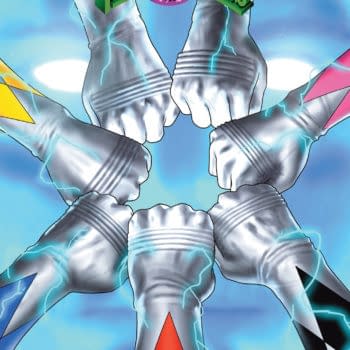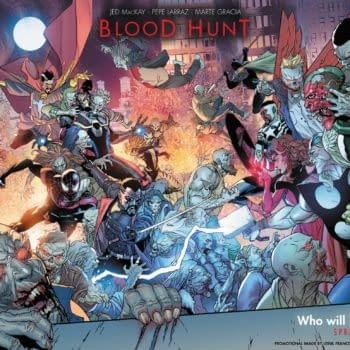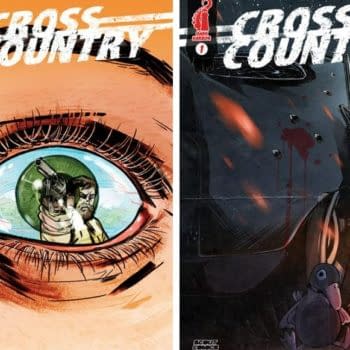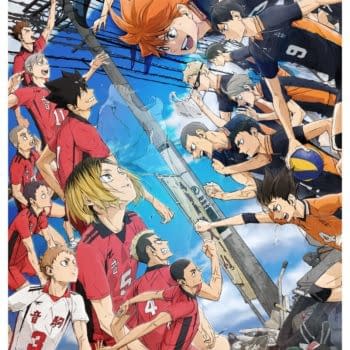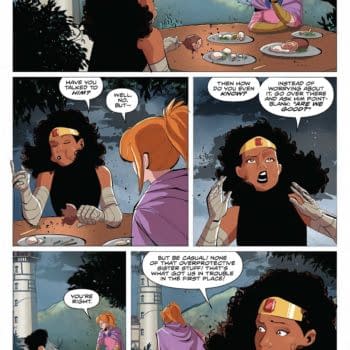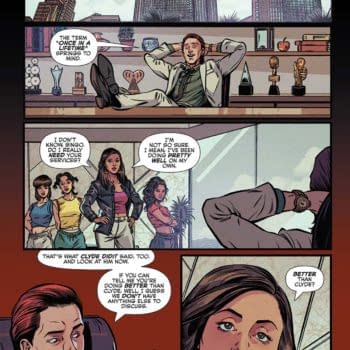Posted in: Comics | Tagged: Comics, larry young, pitch
How To Pitch Your Comic By (Or Possibly To) Larry Young

Here's a simple list of things to include or to be aware of when you send me (in my capacity as publisher at AiT/Planet Lar, or whatever it is I do for First Comics ) your pitch or finished script for a project. You wouldn't believe how many professional writers, folks trying to break in, wannabes, and fanboys all send in work that doesn't pay any attention to these points:
1. Captions and dialogue balloons should have no more than twenty-five words in them. You can get away with a few more if you really have to, but that's a good rule of thumb to keep in mind. If you find yourself writing a caption that has paragraph breaks, find a bridge and jump off it right now.
2. Don't switch scenes in the middle of a page. You would think people would know this one, but they don't. I agree it doesn't look jarring as you're writing your script, but the minute an artist starts to draw it, your boat's leaking water. If you ask the artist to draw an establishing shot on panel three, you've lost your way.
3. The Query Letter with no query. You wouldn't believe how many emails I get with the title of the project as the subject line and the body of the email is: Please review my comic book script at http://www.whatever.com
I sometimes wonder what is going through people's minds as they type that out and hit send. They do all the hard work finishing a script they think is entertaining and worthy of publishing… and then they don't do the barest amount of effort on the email? No "This is right up your alley and has a great marketing hook." No "This script took me five years to write and it'll take you a half-hour to read it, but it'll be the best half-hour you've ever spent." No "It's been my dream to be a comic book writer, and I'd love for you to help me achieve my dream." No call-to-action. No nothing.
I answer every single query email sent me, because if you do the hard work of writing a script, you deserve a prompt answer to your query email. Sometimes I give advice; sometimes I give lengthy notes on what I would address to make it publishable. Sometimes I just answer, "Sorry; we're not looking for new writers right now." But the guys who just write, "Please review my comic book script at http://www.whatever.com," those, I just delete. Such an economy of words drives only an economy of response.
4. Oftentimes I get completed works. It's the best way to judge a comic, since the writing and art and lettering is complete. But the one mistake rookie letterers make sets my teeth on edge: personal pronoun Is in the middle of words. You know: I, I'm, I'll… there's a straight downward stroke with cross bars across the top and across the bottom. THIS LETTER DOES NOT BELONG IN THE MIDDLE OF WORDS. "Pint," "Survive," "Electric." … just the downward stroke, please. I've only lettered two thousand comic book pages, and <i>I</i> think you're an idiot. Imagine what Rich Starkings or Clem Robins or Tom Orz thinks of you.
5. Sometimes folks are so excited, they forget how to pitch. I wrote this to answer somebody on one of Warren Ellis' message boards; delphi, The Engine, White Chapel, I dunno. But it's worth repeating:
Let's say you want to pitch me something (you have) and let's say I told you what I want to hear in a pitch (I did). Let's say even though I make no secret that I don't want to hear pitches from people (I don't), I have enough talented friends that they still pitch me stuff anyway (they do). Lots of these folks work in creative areas that are not comics, and they pitch me in a way that works in their area of expertise but maybe not so much in comics (also true). Since I get one of these well-meaning calls or emails at least twice a week, I have finally been broken down by the persistence of the talent and have written this down. This is the Holy Word; the way to pitch ME your project. But since everyone's creativity is coming from a different place, I can't show you how to pitch your INDIVIDUAL project. But you've seen STAR WARS, right? Let's say you're pitching a publisher the original STAR WARS as a graphic novel. THIS IS ALL YOU NEED:
Tonally like the FLASH GORDON serial cliffhangers of old, this 144 page OGN has us meet a desert planet farmboy, LUKE SKYWALKER, who gets caught up in an epic rebellion against an evil Galactic Empire. Guided by a member of the old guard, OBI-WAN KENOBI, Luke is swept up into intergalactic intrigue and machinations along with PRINCESS LEIA (last survivor of a doomed planet) and HAN SOLO (a roguish space pirate). Two robots Luke encounters are secretly carrying plans to the Empire's Ultimate Weapon, The Death Star, and it's up to our unlikely band to deliver the plans to rebel forces in the hopes The Death Star can be destroyed.
Along the way, they are hounded by DARTH VADER, an evil Hitler-in-space sworn to serve the Emperor. Vader has kidnapped Princess Leia and is holding her aboard the Death Star. After the destruction of Leia's home planet by the Empire, Han, Luke and the rest are captured and brought aboard the Death Star as well. Evading the Imperial forces, the lads decide to rescue the Princess and get away clean. Kenobi confronts Vader, a pupil of his until he turned to evil, and sacrifices himself in a futuristic laser sword duel so his crew can get away.
Reluctantly, Luke leaves his dead mentor and Han and the boys escape behind Rebel lines, delivering the plans but inadvertently leading the Death Star to their base and imminent destruction. The rag-tag rebel fleet launches a last-ditch effort to protect their base and destroy the Death Star. Led by Luke and with a last-minute save by Han, evil is vanquished and the good guys win. Cue fanfare; happily ever after.
See? Obviously it doesn't have all the story beats and it doesn't say the droids are comic relief and doesn't even mention Grand Moff Tarkin and Chewbacca, but it tells the three-act breakdown enough that anyone can see whether publishing STAR WARS fits their publishing plan or not. An added benefit is that once you know your story this well, you can pitch the whole thing to a hungover editor on a convention floor in 90 seconds.
This is the secret to the clean pitch, and doesn't waste anyone's time. They're either on your bus or not. They don't like it, pitch it to the next bus. Metaphorically.
6. Don't get cute. Comics are like theatre on the stage: the people in the front row and the people in the back row need to equally be able to see what's going on. When I write a straight-up action-adventure like LIVE FROM THE MOON, it sells so well it anchors the company and allows me to bring you new work by fresh talents. When I write an allegory about the comic book industry using superheroes to make the point (PLANET OF THE CAPES), nobody gets it and I spend the next six months explaining it to the audience and everyone just feels stupid. Lesson? Don't get cute.
But the most important thing a comic book writer should be aware of is:
7. Let the artist do his job. Yes, the writer is the god of this world he's constructed; yes, the project wouldn't exist without you had you not had the idea. But if you want control over every aspect of your story… write a book. Comics are a collaborative medium, so collaborate. Unless it's a very specific story point, don't over-describe the door the main character enters on page one panel one. It doesn't matter if the lock is a single cylinder deadbolt Kwikset or a Schlage electronic keypad if the hero is just going through the door. Let the artist choose what he thinks best for the scene. You're the Daddy, sure, but the artist is going to go through the difficult birth to get your bouncing baby out to the audience. Respect the ink.







